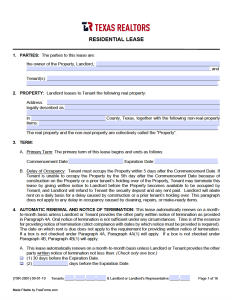
The Texas lease agreement applies a written contract explaining the inner workings of the transaction involving a piece of real estate to be let for a given period. A potential tenant will typically enter into an agreement with an owner after initial acceptance of a rental application. The paperwork provides each of the participants with material evidence of the promises made to be upheld for the duration of the lease.
Rental Application – Often carried out by landlords and management companies, this form is delivered to parties interested in renting a specific property for the purpose of verifying their credentials.

Association of Realtors Version – The latest edition of the Texas Residential Lease Agreement provided by the state’s local realtor group (the previous edition is also available).
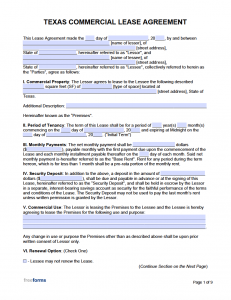
Commercial Lease Agreement – Conveys the implications of an accord to rent a building space for commercial function.
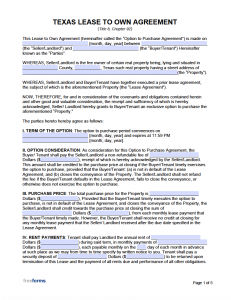
Lease to Own Agreement – A contractual arrangement for rental rights and responsibilities that also includes a clause allowing a possibility for the tenant to purchase at the termination of the agreement.
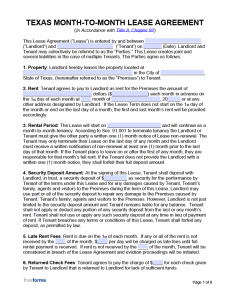
Month-to-Month Lease – Certifies the particulars involved in a lease agreement with the option for the lessor or lessee to end the rental term with thirty (30) days written advisement.
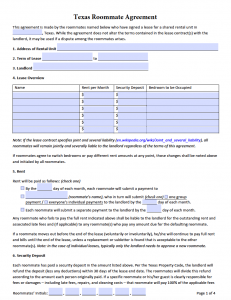
Roommate Agreement – The document employed to secure the right of use for a tenant to utilize a room and communal space for a given amount of time and compensation.
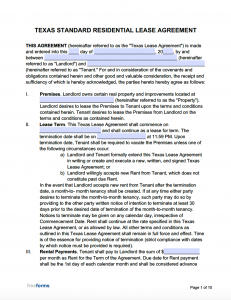
Standard Lease Agreement – Regulates the details of a contract to lease a property for a designated period.
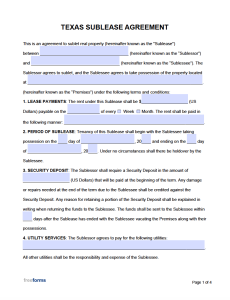
Sublease Agreement – Outlines the provisions associated with a written understanding of a tenant to rerent to another individual for a specified time.
Agreement Between Brokers for Residential Leases – If real estate brokers are involved in a transaction concerning the rental of a residential property, they may implement this agreement to further clarify the amount each party is entitled to.
Inventory & Condition Form – This is a document that records the condition of a rental property prior to moving in and after moving out.
Pet Agreement – Landlords may carry out this addendum in order to establish how many pets a tenant is allowed to possess within a particular property, as well as the code of conduct that must be followed regarding the animal(s).
Residential Real Estate Listing Agreement (Exclusive Right to Lease) – Brokers should execute this contract in order to gain the exclusive rights to rent a landlord’s property.
Additional extensive rental property regulatory law and statutes can be further examined by revising the Texas Property Code – Landlord and Tenant ( §8. 91.001).
Identification of the Landlord or Authorized Personel – The lease paperwork must contain the designation of the names and addresses of all involved owners or managers of the rental property. This may include individuals employed by a management company to oversee and attend to any residence maintenance inquiries( § 8 .92.201).
Lead-Based Paint (42 U.S. Code § 4852d ) – Homes built before 1978 mandate additional disclosure on the risks associated with the presence of lead-based paints. The form included with the lease for properties required to meet this standard will recognize the threat of possible exposure, avoidance, and warning signs.
Parking and Towing Rules – Policy associated with parking guidelines must be included in the leasing document for review and tenant endorsement. Any rule stipulating vehicle towing must be stated in the lease to inform the tenant of property practice before moving in ( § 8 .92.013).
Landlord Liability and Tenant Remedy – If the situation should arise where necessary repairs must be made to the building, where the responsibility lies on the landlord, the tenant must notify the landlord in writing. Once the notification has been sent, seven days will be granted to allow for the assignment of repairs. In the case that seven days have passed with no indication that repairs will be made, the tenant has the right to terminate the lease or repair the property and deduct the cost from the monthly rental payment ( § 8 .92.056).
Property Removal of Deceased Tenants – In the unfortunate event that a tenant should pass away within the duration of the leasing period, the landlord will be required to allow a designated party entry to obtain personal belongings and security deposit. The landlord is obligated to send, via certified mail, notice to the designated individual to appear to gather the personal items within thirty (30) days of mailing the notification ( § 8 .92.014.5)
Rental payments are considered late when they are not received one full day after the due date. The state regulation allows for “reasonable” late fees but does not set a particular amount or percentage of the rent that is deemed reasonable for each selective basis ( § 8 .92.019).
If a monthly rent payment is not delivered by one full day after the due date, a late fee can be charged only if there is specific instruction to a fee schedule in the lease agreement. Late fees can include an introductory late charge as well as subsequent daily late expense for additional days ( § 8 .92.019).
Texas State Property Code does not establish a fixed or maximum amount that can be requested for returned checks. Should a fee be incurred, it must be viewable in the lease agreement to be enforced.
There is no determined cap on security deposits that an owner can request. The regulatory statutes do not provide an established limit or require an issued receipt for a security deposit.
The landlord of the property has thirty (30) days, after the tenant vacates the domicile, to refund the total amount of the initial security deposit ( § 8 .92.103). Deductions can be made from the full amount if there is any significant damage to the property by the tenant, or if there are owed rental payments ( § 8 .92.104).
Emergency circumstance may allow for an owner or agent to enter the premises without first indicating a need to enter to the current tenant. For all normal conditions requiring entry for repair or reconditioning of the home, reasonable notification to the tenant is required, but an actual specified amount of time is not laid down within Texas legislation ( § 8 .92.0081).